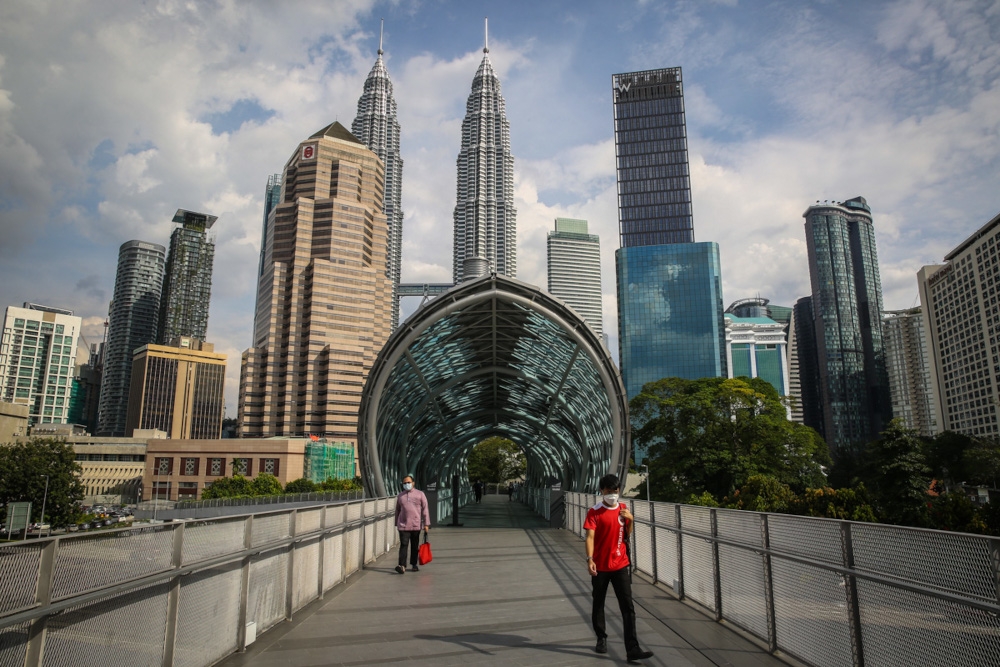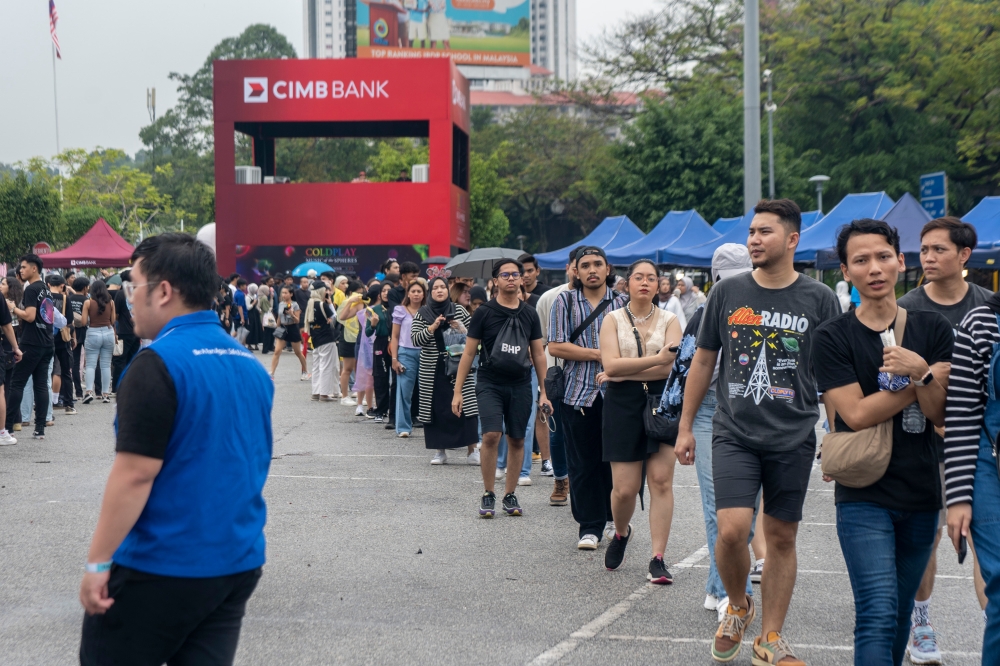KUALA LUMPUR, Dec 5 — Malaysia’s economy stands to benefit from concerts, and the government should work towards drawing in international performers with the assurance that shows would not be cancelled simply and easily, local hotel operators said.
Following reports of the record-breaking attendance by 75,000 persons at British rock band Coldplay’s first-ever concert in Malaysia last month, Malay Mail asked industry players how hotels can benefit from concerts.
Isaac Mohan Raj, CEO of the Malaysian Association of Hotels (MAH) which has over 1,000 members offering over 160,000 hotel rooms nationwide, said the association recognises the “immense economic benefits that concerts bring to Malaysia”.
“From the hotels’ perspective, concerts significantly contribute to tourism spending and have a cascading effect beneficial beyond the event itself. Hotels enjoy increased bookings, particularly during otherwise low seasons, and this heightened business is always welcomed,” he said.
“A significant impact on hotel occupancy has been observed during months with major concert events, indicating a positive correlation. Occupancy for months in 2023 with major concert events showed an average of 188 per cent higher monthly year-on-year growth compared to the 10-month average,” he said, based on industry data for January to October this year and the same period last year.
“While international concerts contribute more to boosting hotel revenue and room occupancies, local concerts also have a discernible effect. The influx of attendees, both local and international, creates a surge in demand for accommodation, leading to increased room bookings and related services,” he said.
Yap Lip Seng, CEO of Riyaz Hotels & Resorts and former CEO of MAH, said events generally increase tourist arrivals, especially international events including concerts that feature popular artistes, as fans would be willing to visit another state just to attend the performance.
“Hotels provide the ease of mind and convenience to concertgoers, and this becomes an opportunity for the industry to capitalise on the events. Demand is usually centred around the event or concert venue but again due to excessive demand, the spillover effect usually benefits other hotels in the same city,” Yap added.

“For example, the Taylor Swift tour set for February 2024 in Sydney and March 2024 in Singapore already saw anticipated occupancy for hotels reaching as high as 60 per cent six months before the actual event, and this gives hotels more opportunity to yield and price their rooms higher,” he added.
Sri Ganesh Michiel, president of the Malaysia Budget & Business Hotel Association (MyBHA) which has over 2,700 members, said concerts — like all big events or major gatherings — would attract many to come and would really help the hotel industry, especially hotels located near the concert venue.
He experienced this personally when he searched for hotel accommodation for Coldplay’s November 22 concert — which was held at the Bukit Jalil National Stadium — in areas such as Bukit Jalil and Kuchai Lama.
“What happened was, the minute I was trying to look for a hotel on that particular day when Coldplay was playing, I called more than 15 hotels and I couldn’t find a room,” he said, adding that MyBHA’s members also reported their hotels being packed during that time.
He said concerts provide publicity for Malaysia and would also draw in tourists, noting that it would not only help hotels but also benefit others such as food and beverage businesses, shopping malls, travel agencies and even travel insurance providers.
Here’s how Malaysia can attract international concerts
Yap was asked if it was good that the Malaysian government allowed the Coldplay concert to go on despite objections or calls by some — such as the Islamist party PAS and some Muslim groups — to cancel the event, and if this would give a good message to concert organisers and international performers.
“I believe it is a good call, although the reasoning was towards the current conflict in Palestine. This however does not provide long-term assurance to concert organisers as it is still deemed to be dependent on current sentiments. Concerts are the same as any other businesses (or even foreign investors) and they need long-term stability and assurance to commit into a market,” he said.
Yap observed that Malaysia is typically not the “first choice” for concert organisers, due to challenges in getting the necessary permits in advance from the authorities.
“Organisers require an extended time frame to manage tours, as far back as one to two years in advance, and Malaysia is unable to provide that assurance.

“This is on top of uncertainties due to the regulatory landscape here where concerts may be cancelled at any time, including uncertainties from other regulatory bodies such as state and local governments. To an extent, it is no longer economically sound to organise concerts in Malaysia.
“This needs to change as the economic multiplier effect of such international concerts (and events) is massive, benefiting many other industries other than tourism and hotels. The government needs to give assurance to organisers and classify them as investors to the economy of Malaysia,” he said.
To assure concert organisers, Yap said Malaysia has to ensure that licences or permits issued for concerts are “legally contracted and secured by system”, and that concerts should only be cancelled based on “force majeure” clauses — just like any “standard commercial contract terms” — and not cancelled due to decisions by “any persons of position or authority”.
In other words, Malaysia should ensure concerts that have already been approved would not be easily cancelled by anyone, and would only be cancelled if the contract cannot be fulfilled due to “force majeure” events — or unforeseen events beyond the control of those involved.
“Secured by system means there are clear guidelines in application and as long as all the requirements are fulfilled, there should not be any reason to reject, or amendments thereafter,” he said.
Asked about situations where special conditions may be added on for different artistes for their concerts to be approved, Yap said these conditions should be “made up front”.
MAH CEO Isaac said: “We eagerly look forward to the continuation and expansion of concerts in Malaysia. Streamlining processes for organising events and providing support for infrastructure improvements at concert venues would be beneficial.”
He added that MAH would welcome “efforts by the government to incentivise international performers to choose Malaysia as a concert destination”.
Isaac acknowledged that concerts have to be regulated, but said Malaysia should also avoid discouraging concerts: “However, we recommend a balanced approach between regulations and incentives. While addressing performances that go against cultural norms, we must avoid blanket policies that make us unattractive as a concert destination. Striking this balance is crucial for the sustained growth of the industry.”

Sri Ganesh, who is also secretary-general of the Malaysian Tourism Federation, said it was good that the Malaysian government had allowed the Coldplay concert to go on despite being pressured to cancel it, as it would have otherwise resulted in hotel bookings being cancelled and other businesses also losing out.
“So if the government had cancelled the concert, it would really have a very big impact on the economy of the industry like hotels. People go for concerts, they don’t go for the concert only, they go jalan-jalan, makan, this is a puller for other states’ people to come to Kuala Lumpur,” he said, adding that nearby hotels had 70 per cent of their rooms being booked for the Coldplay concert and that they would have been impacted if the event with over 70,000 attendees had been abruptly cancelled.
He said events such as concerts featuring international artistes should be allowed to proceed if organisers follow the country’s rules and regulations, and obtain the required permit and all is in order.
But while events such as concerts boost hotel occupancy rates, he said the impact on hotels’ profits “is still very low” as rooms on online booking websites — such as Agoda and Booking.com — are still sold at very minimal prices and as such events tend to be only one or two days long.
To encourage more events such as concerts to be held throughout the year, he said the government needs to provide proper regulations which organisers can understand, and Malaysia should also avoid giving off a negative image to organisers or portraying the country as a place where events can simply be cancelled.
“Don’t give a message to the international organisers that Malaysia is a scary place to come. We must make Malaysia very safe and welcome them, but of course follow Malaysia's regulations and culture, but make them feel they are protected, give them support, then only Malaysia will become an internationally-recognised country,” he said.
He said Malaysia also needs to organise more events in other cities and states such as Johor and Penang instead of just in Kuala Lumpur, and that the private sector such as airlines can also help promote events held here and encourage tourists to book flight tickets to attend such events.





















